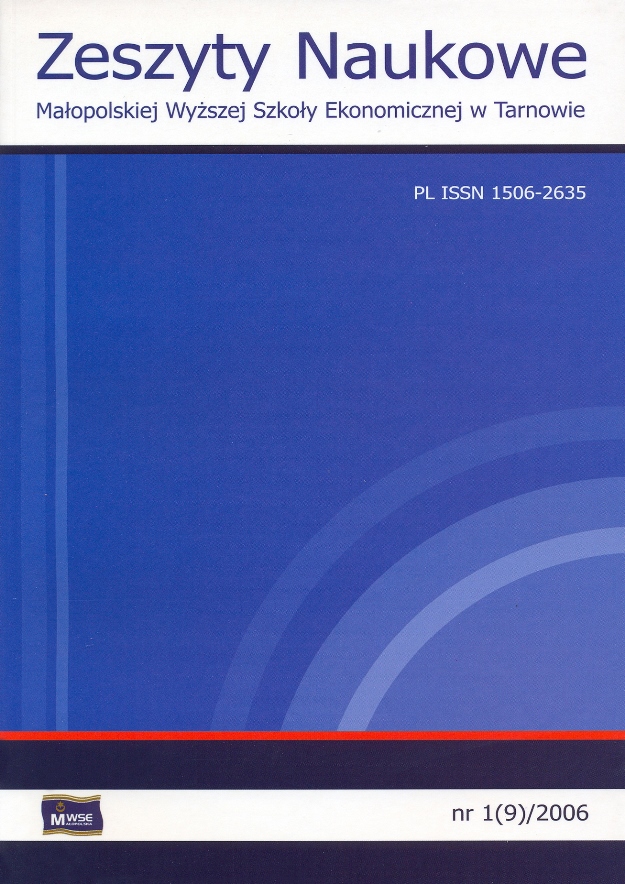Abstract
The article addresses the issue of business ethics in Islam. The first part describes the origin of this religion, in particular from the point of view of the economic situation of Arabic tribes of the period. This part also presents the main rules of Islam. The second part is devoted to the normative principles of business ethics in Islam, which are rooted, above all in the book of the Koran. The normative principles of Islam extend to all spheres of human life, including the economy, and the obligatory normative requirements presented in this article (for instance relating to the activity of usury) correspond to adequate, practical solutions adopted in the daily life of contemporary practicing Muslims. The article also takes a closer look at these solutions themselves.
References
Arystoteles. 1956. Etyka Nikomachejska. Warszawa: PWN.
Biblia Tysiąclecia. 2005. Opole: Wydawnictwo Świętego Krzyża. ISBN 83-7342-074-6. Czasy salah (modlitw) w Polsce. 2006. [online, dostęp 3 listopada 2006]. Dostępny w World Wide Web: http://www.planetaislam.com/czasy/czasy_modlitw.html.
Komentarz Czterdziestu Hadisów Nałałija. Stowarzyszenie Studentów Muzułmańskich w Polsce. Tłum. Ali Abi Issa, kwiecień 1999 [online, dostęp 3 listopada 2006]. Dostępny w World Wide Web: http://www.planetaislam. com/praktyka/nawawi4.html.
Danecki J. 1998. Podstawowe wiadomości o islamie. T. 1. Warszawa: Dialog. ISBN 83-86483-40-7.
Eliade M. 1995. Historia wierzeń i idei religijnych. Tom: Od Mahometa do wieku Reform. Warszawa: Instytut Wydawniczy PAX. ISBN 83-211-1397-4.
Flis A. 2001. Chrześcijaństwo i Europa. Kraków: Nomos. ISBN 83-88508-22-9.
Kamiński I. C. 2003. Słuszność i prawo: szkic prawnoporównawczy. Kraków: Zakamycze. ISBN 83-7333-220-0.
Kietliński K. 2005. Religijne determinanty działalności gospodarczej. W: Religia a gospodarka. T. 1. Lublin: Wydawnictwo KUL. ISBN 83-7363-259-X.
Koran. 1986. Warszawa: Państwowy Instytut Wydawniczy. ISBN 83-06-01168-6.
Niraqui, M. 1991. L' Ethique musulmane. (Tłum. z oryg. ang.: Textbook of Ethics ). Paris: Abbas Ahmad (al-Bostani). ISBN 2-9505157-1-1.
Nydell M. K. 2001. Zrozumieć Arabów. Warszawa: Studio Emka. ISBN 83-88931-04-0.
Schacht J. 1964. An Introduction to Islamic Law. Oxford: Clarendon Press.
Siagh L. 2003. L'islam et le mon d des affaires. L'argent, ethique et gouvernance. Paris: Editions d'Organisation. ISBN 2-7081-2939-2.
Smith A. 1989. Teoria uczuć moralnych. Warszawa: PWN. ISBN 83-01-08276-3.
Steiner R. 2000. Filozofia wolności: główny zarys nowoczesnego światopoglądu: wyniki obserwacji w sferze duszy dokonane metodą przyrodopoznawczą. Warszawa: Spektrum. ISBN 83-907443-3-3.
Tabatabai A.S.M.H. 2006. Moralność. W: Społeczeństwo/Etyka [online, dostęp 7 listopada 2006]. Dostępny w World Wide Web: http://www.al-islam.org.pl/moral.htm.
Tomasz z Akwinu. 2006. Summa theologica. Warszawa: Wydawnictwo Antyk. ISBN 83-88524-08-9.
© Copyright by Małopolska School of Economics in Tarnów. The articles are available under the Creative Commons Attribution NonCommercial-NoDerivatives 4.0 International License


